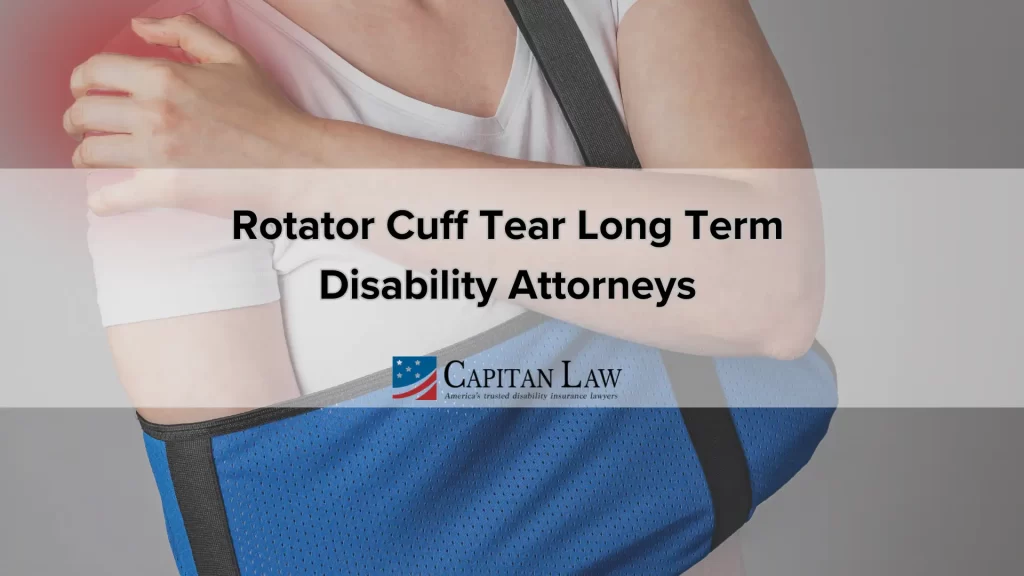
Rotator Cuff Tear Long-Term Disability Attorneys
While we commonly hear of famous athletes sustaining rotator cuff tears, they can happen to anyone, causing pain, swelling, and lost range of motion. If you cannot work because of your rotator cuff tear, you may have the right to pursue long-term disability benefits from your employer.
The Capitan Law team focuses on helping people apply for long-term disability benefits, appeal denied claims, and fight bad-faith insurers. Though our home bases are in Kentucky and Pennsylvania, we represent clients across the United States. For a free consultation with one of our upper extremity impairment attorneys, contact us at (267) 419-7888 today.
What Is a Rotator Cuff Tear?
The rotator cuff is not one muscle but a collection of several muscles and tendons that work together to stabilize the shoulder joint. A rotator cuff injury could affect any shoulder muscle or tendon, though each type has a similar diagnostic and treatment process.
There are multiple causes behind rotator cuff injuries:
- Age and time – “Chronic” tears are the most common type of rotator cuff injury. As someone ages, the tendons surrounding their shoulders will wear down over time and could partially or fully tear by themselves. Generally, a patient may not experience pain, discomfort, or other symptoms until they’ve lived with the tear for some time.
- Repetitive motion – If someone moves their shoulder the same way over and over, they are at higher risk of developing a rotator cuff tear. This risk group includes painters, builders, and athletes.
- Trauma – Some shoulder injuries happen after a car crash or other serious accident. Compared to a chronic rotator cuff tear, someone with a traumatic one will usually experience symptoms immediately.
While either shoulder can be involved in a rotator cuff tear, it most commonly occurs on a patient’s dominant side. Your right shoulder will tear more easily if you are naturally right-hand dominant, for example.
Identifying and Treating a Rotator Cuff Tear
A general doctor or orthopedist will use the following techniques to diagnose and assess a rotator cuff tear:
- Movement tests – Your doctor will ask you to perform or guide you through several shoulder movements, asking you to identify times when you feel pain or discomfort. They’ll also determine whether you have a healthy range of motion in your shoulders.
- X-rays – X-rays can help rule out bone spurs or other malformations that could impinge the shoulder and lead to a partial tear.
- Ultrasound – An ultrasound scan can help your doctor take a precise look at your shoulder and directly identify tears using sound waves. They’re quick, painless, and can be performed alongside a standard physical exam.
- MRI or CT scans – For particularly severe tears, or if trauma was the cause of your injury, MRI or CT images will allow your doctor to identify tears and examine the entire area surrounding your shoulder.
Some possible treatments for a tear include:
- Immobilization – To prevent further damage, your doctor may ask you to wear a sling for a brief time or pause activities that put stress on your shoulder.
- Physical therapy – A physical therapist can guide you through exercises that help you increase your range of motion and restore strength after a tear.
- Injectable steroids – For severe rotator cuff tears, or if over-the-counter pain medications aren’t effective, your doctor may use prescription steroids to stop swelling and relieve discomfort.
- Surgery – If a muscle or tendon is completely torn, your doctor could use minimally invasive “arthroscopic” surgery to repair it. Once the surgery is complete, you’ll need to pause some activities while your shoulder recovers.
 Do I Qualify for Benefits with a Rotator Cuff Tear?
Do I Qualify for Benefits with a Rotator Cuff Tear?
If you had long-term disability coverage before your tear, and if you can’t work due to the injury, you could pursue benefits that cover a portion of your lost wages. Your eligibility for benefits will depend on the specific terms of your policy. A lawyer can help you answer these questions:
- Is my rotator cuff tear a qualifying disability? – Your policy will carefully outline the conditions and injuries that count as “qualifying” for benefits.
- Would anything about my shoulder injury exclude it from coverage? – If the injury happened before you had long-term disability coverage, an insurer may deny your claim even if it would otherwise qualify.
- What is the scope of my policy? – Some policies may approve a claim if you show that you cannot work in your current occupation. Others will only provide benefits if you cannot work in any occupation due to a disability.
- How does my plan change over time? – The terms of an insurance policy can change over time. For example, an “own-occupation” plan might become an “any-occupation” plan after a specific number of years.
How Can a Long Term Disability Lawyer Help Me?
When you work with a long-term disability lawyer, you have the best chance of securing the benefits you deserve. No matter where you are in the claims process, we can help you by:
- Helping you understand your policy – Insurance policies aren’t always written in plain English. We can help you understand your policy’s fine print in a consultation.
- Submitting application paperwork – Our team is experienced with preparing and filing applications in the most complex of situations, such as if someone is disabled due to a chronic condition or if their doctor declines to fill out provider forms for a claim.
- Filing appeals – If an insurer denies your claim or terminates your benefits, it’s your right to appeal. Let us handle the letters and negotiations in pursuit of the best possible resolution.
- Handling litigation – If you don’t have any more appeals for your claim, your legal team might proceed to file a lawsuit and advocate for you in court.
Contact the Capitan Law Team Today for a Consultation
Are you dealing with a complicated long-term disability claim? No matter your location in the U.S., the lawyers of Capitan Law are ready to answer your questions in a free consultation. Contact our office today at (267) 419-7888.
Related Posts:
 Do I Qualify for Benefits with a Rotator Cuff Tear?
Do I Qualify for Benefits with a Rotator Cuff Tear?